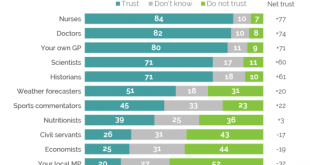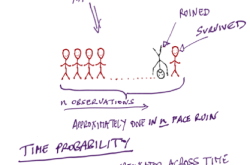Public trust in economists People are obviously not so impressed by the “queen of the social sciences”. And rightly so. Mainstream economics today is more like an ideological-religious conviction than a realist and relevant social science that people can trust for making their lifes or societies better.
Read More »HARDtalk with Esther Duflo
HARDtalk with Esther Duflo [embedded content] This year’s ‘Nobel prize’ winners think that economics should be based on evidence from randomised experiments and field studies. Duflo et consortes want to give up on ‘big ideas’ like political economy and institutional reform and instead go for solving more manageable problems the way plumbers do. Yours truly is far from sure that is the right way to move economics forward and make it a relevant and realist...
Read More »2019 ‘Nobel prize’ reveals the poverty of economics
2019 ‘Nobel prize’ reveals the poverty of economics RCTs have delivered intriguing insights into how poor people think and act, but also into how behavioural economists do. For example, when a slew of high-profile RCTs failed to deliver the evidence that researchers expected on the ‘miracle of microfinance’, the researchers paid little heed to the implications of their insignificant and sometimes even negative findings. Instead, they focused attention onto...
Read More »Ekonomiutbildningarna måste förnyas
Dagens ekonomiutbildningar måste bli mer verklighetsanknutna och framför allt lära ut den roll som pengaskapare som bankväsendet har i ekonomin – om vi ska undvika framtida kriser. Professorer och Lärarkårer på Ekonomiutbildningar, Banker och deras roll i skapandet av pengar är en väsentlig del av moderna, finansialiserade ekonomier. Likväl ges dagens ekonomistudenter en långtifrån fullgod bild av saken. Som personer med makt att påverka nästa generation ekonomer, är det av...
Read More »Uber’s gender pay gap study
Uber’s gender pay gap study Uber has conducted a study of internal pay differentials between men and women, which they describe as “gender blind” … The study found a 7% pay gap in favor of men. They present their findings as proof that there are issues unrelated to gender that impact driver pay. They quantify the reasons for the gap as follows: Where: 20% is due to where people choose to drive (routes/neighborhoods). Experience: 30% is due to experience …...
Read More »Happiness management
[embedded content]
Read More »The ergodicity problem in economics (wonkish)
The ergodicity problem in economics (wonkish) A surprising reframing of economic theory follows directly from asking the core ergodicity question: is the time average of an observable equal to its expectation value? At a crucial place in the foundations of economics, it is assumed that the answer is always yes — a pernicious error. To make economic decisions, I often want to know how fast my personal fortune grows under different scenarios. This requires...
Read More »Häften för Kritiska Studier har fyllt 50
Häften för Kritiska Studier har fyllt 50 År 1968 utkom det första numret av Häften för kritiska studier. Under de femtio år som gått sedan dess har mer än 200 nummer utkommit. För att fira detta tog några av tidskriftens redaktions-medlemmar ett initiativ till en jubileumsskrift som kommer ut nästa månad. Yours truly har ett bidrag med i skriften och tänkte därför ta tillfället i akt att säga något lite mer personligt om denna fantastiska tidskrift som...
Read More »John Hassler — etablissemangsekonom med dimljuset på
John Hassler — etablissemangsekonom med dimljuset på Det finns dåliga idéer. Men så finns det osannolikt dåliga idéer, du kan knappt föreställa dig hur någon kan ha tänkt tanken. Som att Jimmie Åkesson vill etablera omskolningsläger – ”internatskolor” – där stökiga ungdomar ska marschera i takt och fostras till präktig svenskhet … Sedan kommer professor John Hassler med ett förslag som är helt uppåt väggarna knasigt … Sverige har en förmögenhet på mer än 1...
Read More »Consistency and rationality
Axioms of ‘internal consistency’ of choice, such as the weak and the strong axioms of revealed preference … are often used in decision theory, micro-economics, game theory, social choice theory, and in related disciplines … Can a set of choices really be seen as consistent or inconsistent on purely internal grounds, without bringing in something external to choice, such as the underlying objectives or values that are pursued or acknowledged by choice? … The presumption of...
Read More » Heterodox
Heterodox








